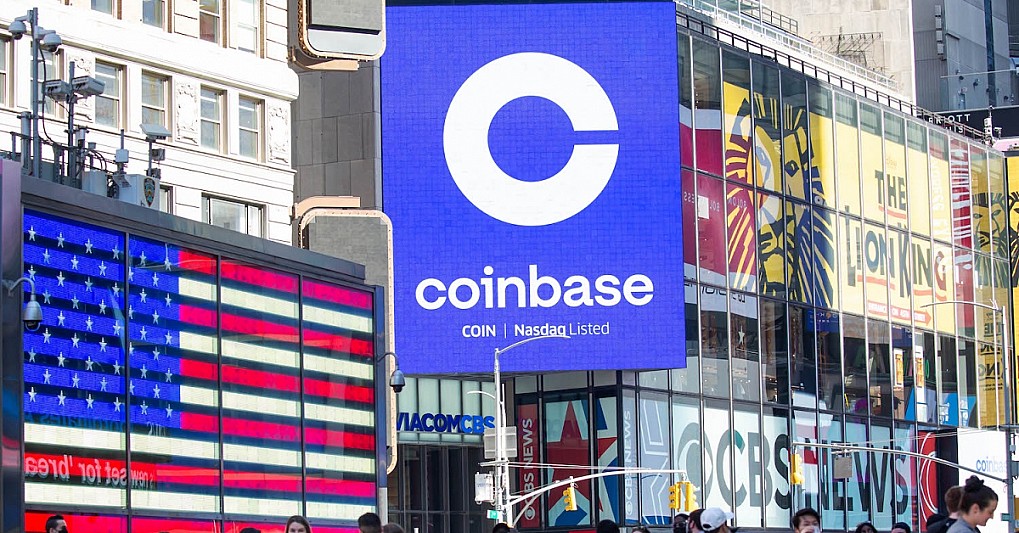Wall Street Welcomes Coinbase as It Enters the S&P 500
13.05.2025 14:00 2 min. read Alexander Stefanov
Coinbase is heading to the S&P 500, a landmark step that reflects both the company's financial evolution and Wall Street’s growing comfort with the crypto sector.
The exchange will replace Discover Financial Services on the index, marking a new level of legitimacy for digital asset firms.
The news drove COIN shares up 8% in after-hours trading, with the stock hovering around $226—still well off its 2021 high but showing strong year-to-date momentum. The inclusion comes after Coinbase posted a profitable first quarter with $527 million in adjusted net income and $2 billion in revenue.
Coinbase has faced an uneven path since going public in 2021, with its early valuation of $85 billion falling as the crypto market cooled. However, a string of profitable quarters and regulatory tailwinds under the Trump administration have revived investor interest.
The exchange recently made headlines with a $2.9 billion deal to acquire Deribit, a crypto derivatives platform. The move signals Coinbase’s intent to dominate not just spot trading, where it already leads in the U.S., but also derivatives—by far the largest slice of the global crypto market.
While competitors like Kraken and Gemini consider going public, and financial incumbents like Visa and PayPal expand crypto offerings, Coinbase’s S&P 500 inclusion places it in a class of its own. MicroStrategy, despite its large Bitcoin holdings, remains outside the index due to its smaller market cap.
As legacy finance and crypto converge, Coinbase’s entry into the S&P 500 cements its role as a bridge between two financial worlds once seen as irreconcilable.
-
1
U.S. Bank Advises Clients to Drop These Cryptocurrencies
29.06.2025 10:00 2 min. read -
2
Chinese Tech Firms Turn to Crypto for Treasury Diversification
26.06.2025 17:00 1 min. read -
3
FTX Halts Recovery Payments in 49 Countries: Here Is the List
04.07.2025 18:00 2 min. read -
4
What Are the Key Trends in European Consumer Payments for 2024?
29.06.2025 8:00 2 min. read -
5
What Brian Armstrong’s New Stats Reveal About Institutional Crypto Growth
29.06.2025 15:00 2 min. read
JPMorgan Lawsuit Threatens Crypto Access and Open Banking Rights
JPMorgan and other major U.S. banks are under fire for a lawsuit aimed at dismantling the Consumer Financial Protection Bureau’s (CFPB) newly established “Open Banking Rule.”
Greed Holds as Market Momentum Builds: What is the Market Sentiment
The crypto market remains firmly in “Greed” territory, with CoinMarketCap’s Fear & Greed Index clocking in at 69/100 on July 19. Despite a modest 24-hour dip from 71, the index has now held above 60 for 11 consecutive days.
Top 7 Crypto Project Updates This Week
The crypto industry saw major advancements this past week across DeFi, NFT, Layer 2, and AI-powered platforms.
Peter Thiel-Backed Crypto Exchange Files for IPO
Cryptocurrency exchange Bullish, backed by billionaire investor Peter Thiel, has officially filed for an initial public offering (IPO), marking a major step toward entering the public markets.
-
1
U.S. Bank Advises Clients to Drop These Cryptocurrencies
29.06.2025 10:00 2 min. read -
2
Chinese Tech Firms Turn to Crypto for Treasury Diversification
26.06.2025 17:00 1 min. read -
3
FTX Halts Recovery Payments in 49 Countries: Here Is the List
04.07.2025 18:00 2 min. read -
4
What Are the Key Trends in European Consumer Payments for 2024?
29.06.2025 8:00 2 min. read -
5
What Brian Armstrong’s New Stats Reveal About Institutional Crypto Growth
29.06.2025 15:00 2 min. read


